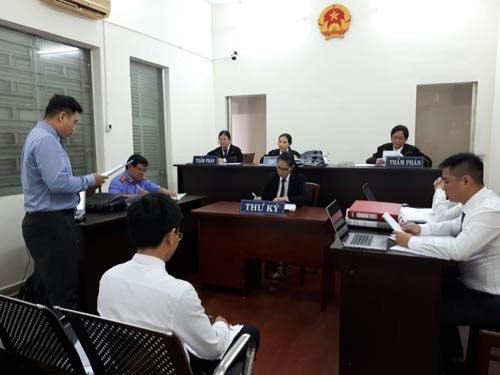
Confusion Surrounding The Commitment Not To Work For Competitors
Recently, during occasions to provide consultation for clients, as well as in participating at conferences or forums on labour law and human resources management, the matter that appears to be of most concern is whether the agreement between employer and employee regarding the commitment not to work for competitors (known as Non-Competition Agreement) (“NCA”) after the employee terminates the labour contract is recognized by the law of Vietnam.
The question may appear very obvious, but to answer and explain it satisfactorily is not simple. The major reason arises out of the lack of relevant legislation and regulations. Meanwhile, through the interpretation and application of available regulations and legal principles, there are indications that point to the Vietnam judiciary no longer always taking the side of employees, often known as the weaker party in the labour relationship with the employer.

From the “Reversal” award
Those interested in NCA of the labour relationship, can hardly ignore the judgment of the Ho Chi Minh City People’s Court in mid-2018 which recognized the validity of the Vietnam International Arbitration Centre’s award, and stood for the employer.
Accordingly, the arbitration tribunal approved the request of the employer, declared that the former employee was under an obligation to pay the damages specified in the agreement – equivalent to three-month salary of the employee for the violation of the commitment not to work for the competitor of the employer within 12 months after labour contract termination.
The arbitration award shall be final and also be recognized by the competent court which attracted numerous legal experts expressing their views.
Whilst this field of law is becoming increasingly commonplace, the regulation of the laws of Vietnam regarding this field is still in their early days. Hence, the judgment or award shall be delivered upon the inner belief of the judges (there may be the subjective consideration of the arbitrator or the judge). Indeed, this is such a confusing state of affairs for parties. No one could be assured that if the dispute is resolved by another arbitration tribunal, another judge or another local court or the court of the higher level, what the judgment or award shall be. Most people “see eye to eye” on the opinion that this commitment only means to “beautify” for the NCA, because in the event of going to court over a dispute, it is believed that the court shall consider this agreement as having violated the right to work, and freely choose the types of professions and workplaces of the employee protected by the laws of Vietnam.
This point of view has been unofficially acknowledged by the Labour Court of the Supreme People’s Court for many years. In the Panel Report in regard to the Trial of Labour Cases in 2006, this State agency affirmed that the “Non-Competition Agreement (consisting of the commitment not to work for the competitors) constrains the employee’s freedom from working and choosing the workplace.”
For this reason, to assess the impact of the recognition of the agreement regarding not working for the competitors of the Ho Chi Minh City People’s Court, a legal expert affirmed that this important precedent shall change the whole perception of employees when entering into the agreement with the employer.
Employees and their authorised representatives must now be conscious that in case there is no legal basis, if a dispute arises, they cannot be confident of being protected/favoured. In the opposite direction, it is clear that the anti-competitive clause is no longer just a deterrent. In the event of a dispute, the person with competent jurisdiction can consider this precedent as a reference in order to deliver the judgment in favour of the employer.
After the judgment, the employer made an attempt to “accomplish/reinforce” the NCA
Having reviewed the NCAs which were newly drafted or supplemented, it is noticeable that the “investment” of employers in accomplishing the content and the coherence of these documents has increased significantly.
Notwithstanding, it seems employers are “encouraged” by the Judgment. Instead of perfecting trade secrets, technology secrets as well as building the system to protect such secrets effectively but not to get a bad reputation regarding deterring the former employee from applying for new employment in a term of time, a variety of NCAs are only constituted to make the employer easily win if there is a dispute with a former employee. Accordingly, the scope of restrictions for employees in the agreement has been extended maximum, which certainly comprise the content directly relating to the commitment not to work for competitors.
For instance, the definition of competitors, in lieu of listing the specific name of each enterprise, the description of the competitors are given (through the business registration code at the present and in the future, consisting of direct and indirect competitors); in lieu of imposing the restraint only on the competitors running the businesses in the operational locality of employers, the scope of restrictions is also extended throughout the country.
For an employee violation, the amount of damages (fixed) is substantial. As far as the author is concerned, in a NCA, the damages for this violation can reach up to a few years of an employee’s salary regardless of whether the violation causes damage to the employer.
The employees terminating the labour contract worry that “what is written binds the writer”
One can say that at the moment, it is during the recruitment and establishment of the labour relationship that is the most appropriate time for an employer to request employee to sign documents, including a NCA. It is not difficult to see the fact that as a new employee, you need to prove your integrity when your assigned work is related to trade secrets, technology secrets of employer, and the employee has no alternative but to sign unconditionally the NCA, which comprises of the term of not working for any competitor of the employer.
Until the moment of terminating the employment or having already terminated the employment, and receiving the warning from the employer in regard to complying with the signed NCA, i.e. not working for competitors of the employer, all of a sudden it shall come to mind a list of enterprises that the employee will not be able to work for in the coming years and the penalty for breaking such commitment.
It will be more serious for the employees in some particular professions such as petroleum or insurance sectors, in which the number of enterprises can be counted on the fingers of one hand.
If an employee fails to comply with his/her commitments as signed with an employer since he/she has entered into the labour contract and decides to counter with the former employer while such employer has no sign of giving up the cases due to be likely to create a bad precedent, the employee shall only hope that the inner belief of different arbitrators or judges could potentially resolving the case in his/her favour such as they used to be.
In need of “action” by competent authorities
Back to the question mentioned at the beginning of this article, through the above analysis, it can be seen that the most practical and concise response is that the NCA, according to which the employee is not allowed to work for the employer’s competitor, has not been officially recognized by the laws of Vietnam.
Although there was an award of arbitrators and recognition of the Court at the provincial level of Vietnam, which recognized the validity of this NCA as a precedent, these awards are just individual decisions in some particular cases. As with any other valid awards, the validity of those awards could be only used as a source of reference for other similar disputes handled and settled by other arbitrators and courts, but could not be used as precedent for all courts in Vietnam when settling this matter.
Not to mention that the originating award was a controversial decision, as above.
Although the commitment not to work for competitors prescribed in the NCA is not officially recognized by the laws of Vietnam, in fact, it must be admitted that the NCA has become quite familiar/common, especially for enterprises in which success in business depends significantly on the confidentiality of information and protection of trade secrets. The fact that employees enter into this agreement has been currently performed by the enterprise and employees by themselves. Notwithstanding, until now, there is no surety that if a dispute occurs, which side the judicial council shall favour.
Hence, in the view of the authors, the “action” of competent authorities, in particular the Supreme People’s Court, is crucial in order to deal with the difficulties regarding this kind of agreement. Nevertheless, the authors’ opinion is that the interpretation of the competent authorities whether leading to recognition or denial of the non-competition agreement, or in the form of a compromise solution (such as half recognition, stipulation of the conditions and limitation of the agreement) should be based on the consideration of the practical situation at present. NCAs, though “deemed” to be based on the spirit of parties being free to enter into agreements, the content of such NCA mostly protects the benefits of employers and binds and limits the lawful rights of employees, including the right to work and freely choose the type of work.


